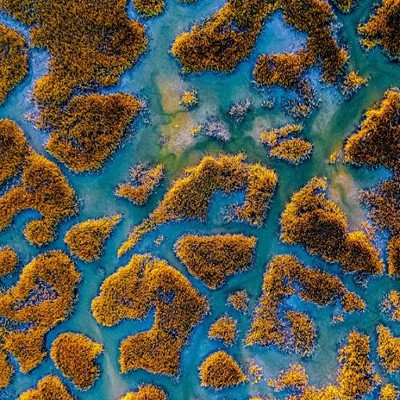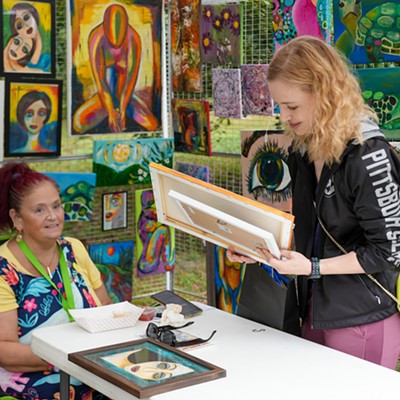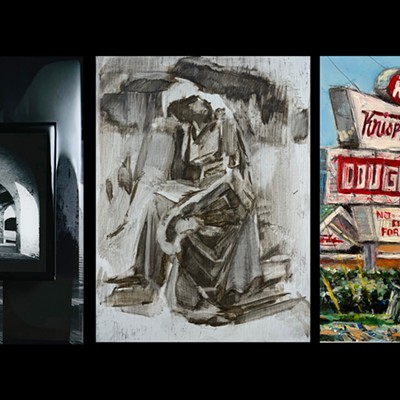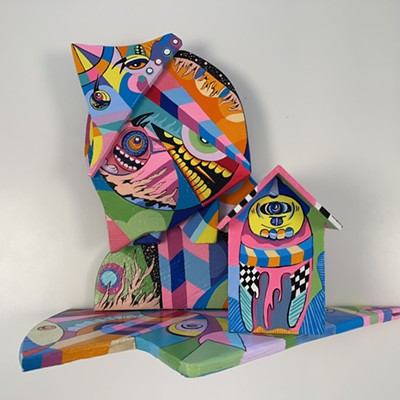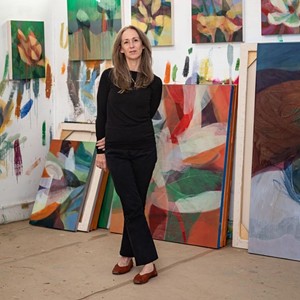Jepson Center exhibition rethinks truth and narratives of artworks
Updated August 11, 2021 at 4:31 p.m.

Never Spoken Again: Rogue Stories of Science and Collections, installation view at Telfair Museums’ Jepson Center.
[
{
"name": "Air - MedRect Combo - Inline Content 1",
"component": "14680855",
"insertPoint": "7",
"requiredCountToDisplay": "5",
"parentWrapperClass": "fdn-ads-inline-content-block"
},{
"name": "Air - MedRect Combo - Inline Content 2",
"component": "14680856",
"insertPoint": "15",
"requiredCountToDisplay": "9",
"parentWrapperClass": "fdn-ads-inline-content-block"
},{
"name": "Air - SVP - Leaderboard - Inline Content - 2",
"component": "16852291",
"insertPoint": "10",
"requiredCountToDisplay": "10",
"parentWrapperClass": "fdn-ads-inline-content-block"
},{
"name": "Air - SVP - Leaderboard - Inline Content - 3",
"component": "16852292",
"insertPoint": "20",
"requiredCountToDisplay": "18",
"parentWrapperClass": "fdn-ads-inline-content-block"
},{
"name": "Air - SVP - Leaderboard - Inline Content - 1",
"component": "16852290",
"insertPoint": "25",
"requiredCountToDisplay": "22",
"parentWrapperClass": "fdn-ads-inline-content-block"
}
]
Continuing its self-reflective, public contemplation on the role of museums, Telfair Museums is hosting Never Spoken Again: Rogue Stories of Science and Collections, a traveling exhibition curated by David Ayala-Alfonso and produced by Independent Curators International. Ayala-Alfonso is excited about the exhibition being in Savannah.
“I'm thrilled about Never Spoken Again opening at the Jepson, as I've discovered Telfair Museums to be a fantastic sounding board for the project,” he said. “The history of the museum, as well as the stories and legends that live in the popular imagination of Savannah, speak loudly to the ideas that motivate this exhibition.”
On view at Telfair’s Jepson Center through Sept. 12, 2021, Never Spoken Again connects with Progressive Regression: Examination of a 19th Century Museum organized by Telfair and currently on view at the Telfair Academy.
Deepening the conversation initiated by Progressive Regression about the power and colonial impulses intertwined with the Western model of museum collections, Never Spoken Again expands the narrative beyond the desire to collect, categorize, and understand through objects to include a vital questioning of how objects acquire and create meaning. Further, the exhibition presents a comprehensive understanding of what artists do, how they work, and what museum-goers might expect from artworks when visiting an exhibition.
Erin Dunn, associate curator of modern and contemporary art at Telfair loves the connections this exhibition makes with other museum initiatives. For example, this is the first exhibition ever presented at the
Jepson with English and Spanish interpretive materials.
“In conversation with the historical exhibition Progressive Regression, Never Spoken Again offers a present-day reflection of museum histories and the ownership of knowledge through the incisive work of an incredible group of internationally-recognized contemporary artists,” Dunn explained.
Treating the complexities associated with institutions, collections, and their relationships to power and truth, Never Spoken Again presents a material and ideological position on the aesthetics of art and exhibitions.
All of the artists included in the exhibition push against narrow and constricting definitions of what it means to be an artist.
In their own ways, each artist participates in a dynamic practice abandoning the outmoded notion of artist as isolated studio genius in favor of open, collaborative, and responsive approaches to art making.
Opening the exhibition is David Peña Lopera’s Ave Nocturna (Nocturnal Bird), 2019, a black, parrot-shaped sculpture made from Cinefoil, a non-reflective aluminum material that can absorb light often used in filmmaking.
Surprisingly, it's heated and kept at the temperature of tropical forests. Disorienting to the touch, Ave Nocturna connects with Ayala-Alfonso’s central concerns for the show, Ave Nocturna (Nocturnal Bird) captures the alchemy of fabrication, the dynamic conversations that exist between decontextualization, conservation, speculation, and the agency of formatting alternative narratives.
Ulrik López’s Summon Song I, 2018-2019, an installation of pre-Hispanic ceramic replicas known as gritones or “screamers,” intentionally appears to be objects found at an archeological site.
Lopez places the ceramic vessels on a wooden table with an amplifier set on top as a nod to the object’s functional use as a form of long-distance communication. For both Ayala-Alfonso and Lopez, the amplifier is an act intended to reclaim some of the meaning and purpose stripped from the objects in the process of being recontextualized as artifacts and/or artworks.
Beatriz Santiago Muñoz’s seductively shot video,
Farmacopea, 2013 presents a complicated portrait of the Puerto Rican landscape as one that has been completely transformed ecologically and ideologically. Portraying the impact of colonization, tourism, and the extraction of natural resources, Muñoz points to the difficulty in conceptualizing, relating to, and physically experiencing landscapes.
“We are trying to offer expansive approaches to what art is. Not everyone loves it. But, hopefully we are bringing people to the museum and helping them think of things in a way they haven’t before. We are exploring these ideas and examining traditional Western ideologies of museum collections through contemporary artists and their work, especially by colonized cultures.”
Many artworks presented in Never Spoken Again tap into our collective aspiration for self-actualization as foundational to the human experience. Dunn explains “There is renewed consideration surrounding human agency in how our histories and futures may be reimagined.” Never Spoken Again deepens the conversation while exploring what kind of world we want to live in. Telfair's curatorial team is working to offer possibilities.
Never Spoken Again is on view at Telfair’s Jepson Center through September 12, 2021. For more information visit:
telfair.org/exhibitions/never-spoken-again
Published August 11, 2021 at 4:00 a.m.

